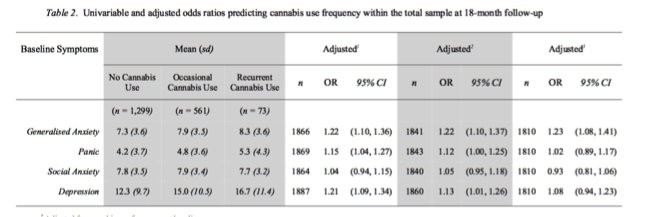
Lexine A. Stapinski1,2 Alan A. Montgomery3 & Ricardo Araya2, 4
1 NHMRC Centre for Research Excellence in Mental Health and Substance Use, National Drug and Alcohol Research Centre, University of New South Wales, Sydney Australia
2 School of Social and Community Medicine, University of Bristol
3 Nottingham Clinical Trials Unit, School of Medicine, University of Nottingham, Queen’s Medical Centre, Nottingham, NG7 2UH, UK.
4 Department of Population Health, London School of Hygiene and Tropical Medicine, London, United Kingdom
Cannabis is the most widely used illicit substance, with a peak in onset and intensity of use occurring during mid to late adolescence (Copeland and Swift, 2009). Global comparisons suggest cannabis use is less prevalent in Latin America compared to more affluent regions such as North America, Europe, Australia and New Zealand (Degenhardt et al., 2008; United Nations Office on Drugs and Crime, 2014). However, national surveys of school students in Chile suggest an upward trend in cannabis use since 2009, increasing to a 12-month prevalence of 30.6% in 2013 (Servicio Nacional para la Prevención y rehabilitación del Consumo de Droga y Alcohol, 2014). This most recent estimate places
adolescent prevalence rates in Chile among the highest in the world (Castillo-Carniglia, 2015). This high prevalence is concerning given increasing evidence that adolescent cannabis use can interfere with normal brain development, leading to deficits in cognitive functioning (Bava and Tapert, 2010; Fontes et al., 2011; Squeglia et al., 2009). Furthermore, research suggests substance use patterns established in adolescence tend to predict adulthood problems such as dependence, psychosocial dysfunction, delinquency, and progression to other drug use (Copeland and Swift, 2009; Lynskey et al., 2003; Patton et al., 2007). A promising strategy for reducing these considerable harms is early intervention to prevent cannabis use during adolescence.



